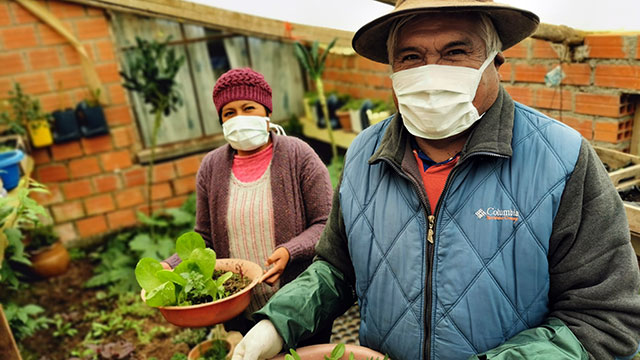
Africa Leaders committed to Food and Agriculture
Ministers from the Near East and North Africa (NENA) approved a historical Ministerial Declaration that sets a foundation for strengthened collaboration across the region to build lasting solutions to the most urgent and pressing food and agricultural challenges, aimed at recovering from COVID-19 impacts and transforming food systems.
The Ministerial Declaration was adopted during the 35th FAO Regional Conference for the Near East (21-22 September), virtually hosted by the Sultanate of Oman, in which 30 FAO Members, as well as representatives from partner organizations, civil society, the private sector and academia, gathered to discuss innovative policy solutions related to this year’s theme “Transforming Food Systems to achieve the Sustainable Development Goals”.
The Declaration focuses on how governments, the private sector, civil society and communities can work together to end hunger and poverty, ensure healthy diets for all and address the growing challenges of water scarcity, climate change and transboundary pests and diseases.
It also recognizes the need to mobilize financial and technical support and cooperation to fund the much-needed investments and innovations in agriculture, water management, food value chains and institutions that will drive these solutions.
In his address to the Regional Conference, the FAO Director-General QU Dongyu listed four important elements to kick start rural transformation, fuel economic growth and help transform the region’s food systems: well-designed multi-sectoral policies that create an enabling environment; innovation of processes and agricultural inputs; well targeted public and private investments; and vital agricultural activity.
NENA countries also acknowledged the importance of small-scale family farmers and fishers, the central role played by women all along the food value chain, and the need to generate more employment opportunities for youth in agriculture.
Hand in hand to address COVID-19 challenges
In light of the COVID-19 impacts, ministers stressed the importance of regional and global solidarity in responding to the global pandemic, welcomed the assistance and resources they had received from FAO in recent months and reaffirmed their support for FAO’s COVID-19 Comprehensive Response and Recovery Plan and its Regional Response Plan, confirming that the areas of priority actions are both highly relevant and consistent with the needs and priorities of the countries of the region.
The declaration also welcomed and endorsed FAO’s Hand-in-Hand Initiative as an umbrella partnership initiative to promote and strengthen bilateral and multilateral cooperation to foster innovation and technologies in food and agriculture systems, mobilize resources and forge solidarity, accelerate the achievement of the SDGs, and transform food systems.
Such transformation, according to the Conference, should come along through gender-sensitive value chain development, technological innovation for all, digitalization that links farmers and their organizations to markets, and targeted initiatives to promote the socio-economic empowerment of rural communities, in particular women and youth.
The Chairperson of the Regional Conference, His Excellency Mr. Saoud Hamood Al Habsi, Minister for Agriculture, Fisheries Wealth and Water Resources of the Sultanate of Oman, referred to the Conference as “strategic”: “I congratulate the Director-General’s efforts for a new vision for FAO towards more efficiency in its programmes and initiatives at country and regional levels, including the innovative approach adopted by the Hand-in-Hand Initiative. The COVID-19 pandemic has revealed the centrality of food security for the economic development of the countries of the region, and I call for a coordinated response to COVID-19 pandemic, as countries have been struggling to ensure agricultural productivity and food accessibility,” he said.
During the conference, the Director-General announced the recent nomination of Ms Ismahane Elouafi from Morocco as FAO’s first ever Chief Scientist, a new position that will further strengthen the technical and scientific dimension of FAO’s work. Elouafi’s background and extensive knowledge of the NENA region will be an asset to respond to the challenges facing Near East and North Africa countries.
FAO Members in Near East and North Africa meet every two years to discuss issues of common concern and guide FAO’s work in support to the region’s food and agriculture.

